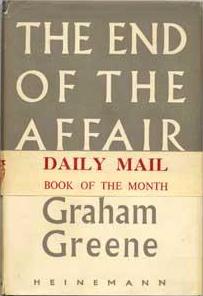― Graham Greene, The End of the Affair
Isn’t that a beautiful start? I fell head over heels in love with the novel the minute I read that opening sentence. However, as it often happens, it was easier to fall in love than to stay in love.
So, What’s It About?
The End of the Affair explores the deconstruction of the end of a relationship.
Sarah is unhappily married to Henry Miles. Maurice Bendrix, a dabbling writer, is besotted with her. Both embark on a clandestine, whirlwind romance during the height of WW2, until one day when Maurice’s apartment is bombed.
Sarah and Maurice survive the bombing but not their relationship. Maurice doesn’t understand why all of a sudden, Susan starts avoiding him and moving away from his life. He spends a good time obsessing over why the love of his life has abandoned him.
A chance encounter with Henry brings back all the rage and pain of the past, and when he meets Sarah, he realizes that she has found a new love. A jealous obsession takes hold of him. Soon he realizes that Sarah has discovered religion and it’s God that’s keeping them apart.

Some Observations
“I’m tired and I’m sick to death of being without you.”
― Graham Greene, The End of the Affair
The End of the Affair is a tragic, tumultuous love story. There are moments when your heart just reaches out to Maurice and Sarah.
Maurice is the most believable, relatable character in the book. Greene’s description of an obsessed and jilted lover is touching and painful.
Sarah remains the more enigmatic character whose motivations are hard to pin down. Having been a serial adulteress, it is strange that Sarah has the courage to cheat, but not leave her husband and walk out an unhappy marriage.
Her Catholic upbringing makes her turn to God, and that Catholic guilt leads her to make choices I don’t understand. Here lies my fundamental problem in the understanding of the novel. I am not a religious person and though I believe in God, he generally does not interfere with my day-to-day living.
Now Maurice is also not particularly religious, so when he discovers that God is keeping Sarah away from him, he is understandably devastated.
I think Sarah is a very confused woman. On one hand, she is racked with the guilt of cheating on Henry, but on the other, she is deeply in love with Maurice. She ardently believes that she owes a debt to God for Maurice’s life, and she thinks God can help her find a solution to this. Honestly, at this point, I just want to yell — “Get with him already!”
“I had to touch you with my hands, I had to taste you with my tongue; one can’t love and do nothing.”
― Graham Greene, The End of the Affair
The writing is impeccable and something that I have come to expect from Greene’s novels. He can put so much misery in a sentence and yet make you smile at the end. Greene’s The End of the Affair is dedicated to C. That is probably a hint to the autobiographical nature of the work, for C is none other than Lady Catherine Watson with whom Greene had an affair. One is left wondering if Greene was as miserable with Lady C as Maurice was with Sarah.
For more book reviews, go here


